Book Reviews by Genre: Science Fiction
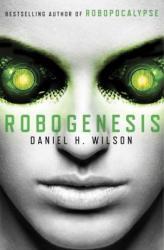
While I appreciated the logical nature that Daniel H. Wilson brought to the idea of a robot apocalypse in Robopocalypse, I felt the book itself was disjointed as a series of short stories that examined the various forms our robot servants would turn on us. The whole book seemed more like an academic exercise than a piece of fiction. In the follow-up to Robopocalypse, Wilson picks up right where the last book left off. With the exposition of how the robots turned on us already covered, he then is able to fully explore the fictional environment via its characters in Robogenesis.
It took me a little while to recall who some of these characters were and what had happened during the previous book, which left me confused in the early moments of each section. Once I eventually got my bearings, the stories themselves were interesting and tied together pretty well. Some of the action was a little disorienting, but overall I had a good idea what was happening. There were a few storylines I would have liked to see fleshed out more (like Matilda’s storyline), as well as some that were perhaps fleshed out too much.
And by “fleshed out,” I’m of course referring to the almost gratuitous and graphic violence that’s present in this book. I’m not sure it was really necessary, and it was more unsettling than anything else. I mean, I get that the end of the world will be violent, but it doesn’t need to be described in gory detail. At least by the end of the book, it looks like there’s a satisfying conclusion, but with the clear indication that the war is not over. This means I’ll probably have to read the next book in this series whenever it comes out.
A good sci-fi that blends realism with a few entertaining characters, I give Robogenesis 3.5 stars out of 5.
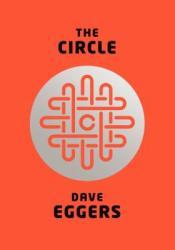
The only reason I read this book was because of the movie starring Emma Watson and Tom Hanks but I'm one of those who [for the most part] read the book first before watching the movie because we all know that books are always better and have more details than the movie versions.
I've been on the fence about deactivating my Facebook and Twitter accounts and signing up for Instagram or keeping my blog, Ravelry and GoodReads active since I use Ravelry and GoodReads mainly as online databases for my yarn craft and books respectively so I won't have to create an offline database from scratch and my blog as a way to share things that I enjoy and my book reviews like this one. The Circle by Dave Eggers definitely showed some pros and cons to going "off the grid" to quote Mercer and some pros and cons to being online to keep up with family and friends and social media is good way to reconnect with old friends especially if you have no way of contacting them because your address book hasn't been updated in a long while.
Enter Mae Holland who hasn't used her social media account in a while and ends up working for the Circle, a tech company who is all about sharing [everything] and being social online and offline and unifying everything into one account. I rated this book 4 stars not because it's really good but mostly because the author managed to make me feel something and made me think. When Mae first started working at the Circle, I felt as stressed out and exhausted as Mae felt while learning about her new job and balancing her work-related duties as well as her "social" duties and the constant need to "smile," "frown," and "zing" can be overwhelming for someone like me who likes to moderately share things online. Yes, I do believe that there are things that should be kept private and still do even after reading this book.
I don't think it is healthy to spend so much time online "smiling," "frowning," and "zing-ing" what other people share to the point where you no longer have time to live your life in the real world. And changing your opinions because you don't like getting "frowns" is not being human. Being human is about having different opinions and thoughts and it shouldn't matter if your opinion is unpopular because it is you. The way it is presented in this book is that slowly, everyone in the world is of one mind, one opinion which is already happening in the real world. People get shamed, hated on or bullied online when you express sentiments that are not in line with the sentiments of others. And this mentality should stop.
There are some aspects of unifying databases from this book that I liked the idea of. An example would be medical records that way when you switch medical providers or during medical emergency situations, all your records can be found in one centralized system/location to make it super efficient for the medical team to give you the right medication or treatment as well as if you're unconscious, there's a way to alert your medical/care team to send help. While it is also great to get real time results on polls and surveys, being forced to vote by suspending all electronic/computer/online activities until you've voted is wrong in the sense that people have the right to vote or not vote. Sure it will help a lot if everyone voted but to make it mandatory like what the Circle suggests violates the right to decide whether to vote or not. I'm on the fence about humans getting micro-chipped like most of our pets are micro-chipped because I personally don't want everybody in the world to know where I am. I only want my I.C.E. (In Case of Emergency) contacts to know where I am and that's about it. There's more examples in this book that I'm either on the fence on or completely against the idea of but I have to end it here otherwise, this review will be as lengthy as the novel itself.
Moving on to the general overview of the plot. It's believable to some degree and I can see the parallels to the real world especially on the social media aspect and we are somewhat slowly getting there on the other technological aspects. The pacing of the story is slow to moderate and sometimes it makes you think if there's any point to this whole thing. The whole time I was listening to this book, I was waiting for a really cool plot twist or a big revelation or a big self-discovery, but unfortunately, none of those happened. There was a revelation towards the end but it was a bit of a let down because somehow, at the back of my mind, I already knew that.
As for the characters, I feel like they're not as well-developed as I'd hoped. There's no real depth to Annie, Dan, Jared, the three wise men, Francis, or any of the rest of the characters, including Mae (more on that, later). It feels like these other characters are there to either add drama in the case of Francis, to move the story along in the case of Dan, Jared, the three wise men, etc., and as proof of validation and someone to vent to as in the case of Annie. As for Mae, I somewhat resonated with her in the beginning but as the book progresses, her character became less real and more fake in the sense that the Mae readers liked in the beginning slowly disappeared as she became "one with the hive" err Circle and lost her own individuality. Another thing that was disturbing about Mae was in the end, while visiting her catatonic best friend, Annie, she looks at one of the monitors scanning Annie's brain waves and wonders what Annie's dreaming/thinking about while in a coma and decides that people's thoughts should be accessible to everyone and that "the world deserves nothing less" which to me, is frankly, quite disturbing.
Finally, the narration. Dion Graham did a wonderful job narrating/reading this book even though this book follows Mae's perspective and there's none of that high-pitched voice trying to sound like a woman/girl.
In conclusion, if you are someone who shares everything online then you might enjoy this book and if you are someone who is on the verge of deactivating all of your online and social media accounts, you might find extra reasons in this book to permanently go offline. If you are someone who likes to see characters evolve into a better version of themselves, this book is not for you.
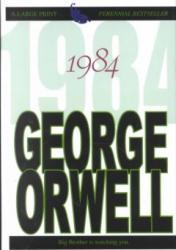
1984, written by renowned author George Orwell, a pseudonym for Eric Arthur Blair, follows the protagonist Winston Smith set in what Smith believes to be the 80s in London. In fact, Smith is not sure of anything anymore, definitely not the exact year or what happened to his family or who the mysterious dictator called Big Brother is or who his state is at war with. Eurasia, right? No, must’ve been Eastasia... All Smith knows are the mottos of each of the ministries that form the government in Oceania, where London is. WAR IS PEACE. FREEDOM IS SLAVERY. IGNORANCE IS STRENGTH. He is told what to think, what to say, and what to do for nearly every part of his life. His government banks on strict organization and dire consequences for disobeying the rules. 1984 is an interesting read that set the bar for dystopian novels, defining inefficient governments from real life examples.
The novel is more realistic being inspired by Orwell’s hatred for totalitarianism and the events of World War II. I recommend 1984 to anyone curious about examining different types of societies, their standards and how those effect the population. The novel is fairly political and examines rebellion, although not as face paced as typical young adult reads. 1984 allows for an in depth examination of the character’s internal conflicts, Winston is one of the more detailed and complex protagonists because there are many parts where he cannot he sympathized with due to his lesser characteristics. The setting is clearly presented in a more world-building way than just giving out straight information. I was especially pleased, surprised, curious, and angry throughout the progression of the story.
Overall, I did enjoy this book more than most others, but the fact that Winston does not form any significant relationships until the second part and is the primary person talking, I was relatively bored during the middle chapters.
Reviewer Grade: 11
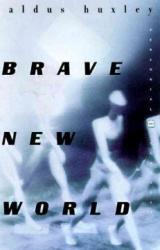
Among one of the first Dystopian genre novels ever published, Aldous Huxley’s Brave New World questions the extent at which technology could potentially control society. Set approximately 632 years after the creation of the Model - T, a World State now controls society with the intent on eradicating personal thinking and individual creativity. With a new system called the Bokanovsky process, the World State utilizes the idea of Henry Ford’s assembly line to produce thousands of nearly identical embryos that will grow up to work for the State. All embryos are conditioned to be in one of the 5 castes: Alpha, Beta, Gamma, Delta, Epsilon; with Alphas destined to control the World State and Epsilons to perform menial labor. When Bernard Marx, Helmholtz Watson, and John decide that something is wrong within this “perfect” society, they take it into their own hands to expose the World State and stop this flawed Utopia. Huxley’s novel, written in only 4 months, is phenomenal because it challenges the ideals of the limits to which technology can override nature. With the novel being published in 1932, Huxley questions practices that were uncommon and unrealistic back then, but are slowly becoming a reality now as our society leans more and more towards technological innovations. I recommend this novel to high school readers, especially those interested in the Dystopian genre, since this is a perfect example of a Dystopian Utopia.
Reviewer Grade: 11
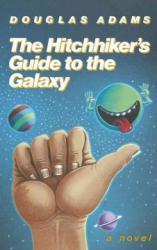
The Hitchhiker’s Guide to the Galaxy by Douglas Adams is witty, genius, and an example of common English humor: dry, but hilarious.
Seconds before Earth is blown away to make way for an intergalactic freeway, Arthur Dent discovers galaxies and planets, lightyears beyond his own. He hitches a ride with his best friend, Ford Perfect. Ford is a cleverly disguised alien, who has been stranded on Earth for the past 15 years as he writes a revised guide to the galaxy. Arthur and Ford happen to hitch ride with the most disagreeable and intolerable creatures, the Vogon. They are then discovered and thrown into the soul-sucking abyss of space. Seconds before they suffocate, Ford and Arthur are picked up by a recently stolen ship, stolen by the president of the galaxy, Zaphod Beeblebrox, and his girlfriend, Trillian. The ship is on an improbability drive, which is why they crash land on a long believed mythical planet, called the Heart of Gold.
The planet was in a hibernation-like state, and has only just awoken recently. Trillian, Ford, and Zaphod explore while Arthur meets Slartibartfast, who explains that the Earth was a test, run by mice, to discovery the Question of Life, since they know the answer is 42. However, Earth was destroyed seconds before test completion. Trillian, Zaphod, and Ford are captured by the mice and kept in a dream-like prison. That is, until Arthur is brought to the mice and the group is reunited. The mice explain that they are interested in harvesting Arthur’s brain as organic evidence.
So, naturally, the group manages to escape in the knick of time, avoiding both the mice and the galaxy police, who are searching for Zaphod.
Reviewer Grade: 7
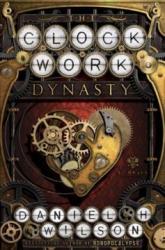
When I picked up this book, I have to admit, I was surprised, because sci fy steam punk fantasy stories is not the type of book I usually read, yet it ended up being so much more than I had imagined. The Clockwork Dynasty is not just a book about a race of humanlike mechanical creatures or avtomats that secretly live among us and are fighting a war that has raged for centuries, but it’s a story about life and the constant search for meaning and purpose.
This book waffles back and forth between present day Orgon, Washington and other places, and the 1700’s beginning in Russia and taking the reader on a journey through history and time. And while this may bother some people, the non-linear storytelling I think, adds so much more to the book and allows the author to unfold the story in a deeper more meaningful way.
In present time it follows the story of June someone who has made a career in ancient technology, ever since an encounter she had a child with her grandpa changed her perception of the world and started her fascination with this avtomat technology. A couple years after her grandfather’s death she receives a avtomat artifact that will cause her to team up with an avtomat named Peter, launch her into a great adventure in the secret avtomat
world, and ultimately determine this race’s extinction or survival. In
the 1700’s it follows the story of brother (Peter) and sister (Elena) two humanlike avtomats that were resurrected by a Russian clock maker using something called an anime which serves as the Avtomat’s heart and soul. As they live through the years they spend it hiding their secret, trying to blend into society, and fighting a war that has been raging among their own race for centuries.
This story explores the character’s constant search for meaning in a way that is both at times sad and extremely insightful. In the book each avtomat’s anime is marked with a Pravda or a special word that is their bond and command. As long as they satisfy their Pravda, they are at peace, otherwise they suffer. In Peter’s case this word is justice. As the book progresses we see his idea of justice shift and change as he lives through the years. Through a fascinating inner dialogue, Peter perception shifts from gaining justice simply by serving rulers in war to something far deeper and more moving, as this quote, when he encounters a dying soldier on the enemy’s side in the battlefield, suggests:
“Once Pravda was clear to me. By obeying my emperor all was well. But what was simple is becoming complex. I can see no evil inside this grievously wounded man, only honor. And though no clockwork flutters beneath his throat, I can see the inevitable forces that led him here, through no fault of his own, fating him to die in the shadow of this crumbling wall.”
As the book progresses a new perspective of right and wrong emerges leaving him questioning not only who he is but why he was made.
Another major theme this story also explores is the theme of war. As Peter recounts from his past, countless experiences on various battlefields throughout his life, and in the present, his own thoughts on his own race’s war; the reality of war is pressed heavy on the reader making this book at times very depressing, sad, and dark.
This reality is made even more real by the moving prose and incredible worldbuilding that takes place throughout the book. Another reason I love this book is the incredible character development between Peter and Elena.
How she is treated by him as a little sister at the beginning of the book, and how he sees her changes through the book from a little girl needing his protection to a sophisticated, wise learned, woman who’s one desire is to make her own way in the world is absolutely incredible. Daniel H Wilson does an amazing job of weaving together past and present into an engaging literary story that has something for everyone. Thank you to Doubleday books and Netgalley for an e- ARC in exchange for an honest review!
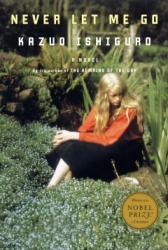
Kathy isn’t a normal kid, and neither are any of her friends. They were all cloned, and someday, their vital organs will be harvested until they die. But for now, they will grow up in a secluded boarding school nestled in a corner of England, called Hailshem. Hailshem is idyllic: creativity is nurtured, friends are everywhere, and there are supported teachers. Kathy retells her experiences as she looks back on her life in preparation for her organ donations. And…. that’s basically it. It sounds like a really interesting concept for a book, but the author completely butchered it! His writing drags on and on, and completely bored me to death. If he had written it better, or if someone rewrites it, the book would be fascinating. But the writing style is so dreadfully dull. I warn you-- do not read this book! You will seriously regret it if you do!
Reviewer Grade: 7
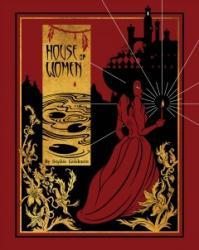
What happened to the last expedition? Was the last expedition male? Where are the male of the local species? Is Jael the only male in the area? Has he created his own harem of native women, driving off the males with his pheromones?
I found this book on a must read list from NPR for 2017. It looked interesting and had a fascinating synopsis and review. I read it, liked the drawings and wanted to know who “Jael” was from the story. The last interaction between the women is about his criminal history. Aphra asks Sarai what it says and she responds with “It doesn’t matter.” However, I suspect it does, I think it had a direct impact on everything that occurred in the story. The author did a good job of “setting the hook” with that closure. Considering the dream fish sequence, I think it was intentional. As I reread the story a few more times, elements that seemed trivial began to come together and illuminate more of the story. I think it is worth a read, or several reads.
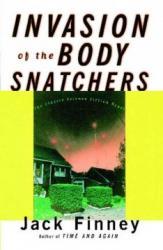
Most people know this book by its numerous film adaptations, including Invasion of the Body Snatchers (1956 and 1978), Body Snatchers (1993), and The Invasion (2007). In fact, I like to think that many facets of this story have become a part of popular culture, including the replication “pods” and Donald Sutherland’s scream in the 1978 film version. While the source material is inherently pulpy, a result of the genre and the era in which it was published, there is an entertaining quality to the story that has allowed it to survive for so long.
Simple in its execution, but brilliant in its reveal, The Body Snatchers builds up an inherent distrust of the people surrounding the main characters as they investigate why everyone seems “off” in this small, California town. While the full explanation of the aliens’ presence and purpose is relegated to an enormous information dump more than half-way through the book, it nevertheless contains some interesting ideas and concepts that could be plausible given the circumstances. I would have preferred better integration of this information into the plot, but sometimes the characters just need to sit down and explore these ideas in depth.
In the end, The Body Snatchers has plenty of strong moments in its plot. Sure, there’s the weaker section or two, and the more upbeat ending didn’t have much explanation other than the aliens’ annoyance of humanity’s persistence. Still, it’s a fun story, and even decades later it’s clear why The Body Snatchers is a timeless classic, even if it’s not “on par” with more significant literary titans. Maybe that’s its charm, though. By making it about the “everyman,” the horror and terror of everyone around them being replaced by emotionless beings is much more relatable on a visceral level.
A timeless pulp classic, I give The Body Snatchers 4.0 stars out of 5.
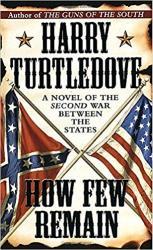
How Few Remain is a alternate history novel by Harry Turtledove. In his book, it depicts an alternate universe where the south wins the American Civil War, and the Confederate States of America is now its own independent country. What I enjoyed about this novel is the many different characters and how they view the other country. In every page you can just see the tension that will eventually snap between the two powers. People from the North and the South always spewing insults at each other. Each character that comes into play are very interesting and all seem like they have their own backstory. My favorite character in the story would be Abraham Lincoln. Just because you get to see what his life is like and how the country views the man who lost the civil war. The book is also just the first part of a series which goes through the period of World War I and World War II and how the North and South react to that. I believe there are two things that make this book standout, its characters, and its lore. For those two reasons alone I will have to recommend this book. Or the entire series, what ever is your cup of tea.
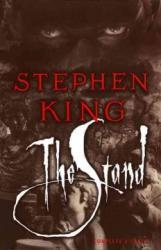
The book "The Stand" by Stephen King is a novel about a disease. It starts out at a gas station where the disease is first seen in the novel. This book has many different characters as it progresses. The main antagonist is the embodiment of evil. He is basically the Antichrist. Although I didn't like this book as much as some of Stephen's other works because I have a short attention span and some parts are not attention grabbing. It is still a very good book and I would definitely recommend it to anyone who likes horror. This novel is very unpredictable which is one of the main reasons I like it as much as I do. Because there are so many characters in this book, it was very easy for me to relate to their situations.
Reviewer Grade: 9
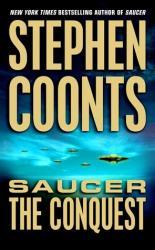
In this Sci-Fi thriller sequel to the first Saucer book in the series, Stephen Coonts brings back ex-air force test pilot Charley Pine, Rip Cantrell, and some new key characters. Charley Pine is hired to fly a french spaceplane to the moon, where she finds a french Millionare by the name of Pierre Artois. Charley soon finds out what Artois and his conniving wife Julie are actually up to. A massive Anti-Gravity gun is stationed on the moon, Pierre and his wife have been planning for years for their ruler ship over the earth. All the while this is going on, Rip's uncle, saucer expert, Egg Cantrell is kidnapped by mad scientist Newton Chadwick and is forced fly him to the moon in another saucer... Rip Cantrell and Ms. Pine find out about this and steal another saucer from a Smithsonian. Soon a fierce battle in outer space takes place. Who will come out on top? This sequel to the first Saucer book should definitely be on everyone's radar. Young or old, this book will leave you all wanting more more every page you turn over!
9th Grade Review
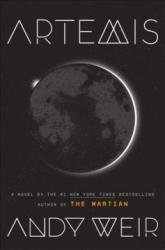
After reading Weir’s breakout work, The Martian , I looked forward to his next novel, Artemis, with rapt anticipation. The scientist in me appreciated how Weir made a realistic setting with realistic science an approachable and entertaining endeavor. The writer in me liked how he kept the tension throughout the plot of The Martian at a consistent level. Consequently, I had high hopes for Artemis and wondered if he could outdo himself (or at least match his previous success) considering how highly regarded The Martian ended up being for him.
Between the two books, Weir seems to have created a style that consists of three elements: accurate science, event-driven plot, and a racially diverse cast of characters. In Artemis, we now find ourselves on the moon, where a colony has been created and sustained for a few decades. Weir conveys the science involved with such a feat naturally and realistically. The exploration of this science is usually through the string of “oh shoot”
events that occur throughout the plot. Finally, with an Arab woman as the main protagonist of the story, supported by a Kenyan man, Ukranian scientist, and her father.
Despite these three elements creating an exciting story, the impact of Artemis felt less than that of The Martian. In The Martian, the driving force of the plot is the survival from isolation. Artemis has a different survival:
avoiding homelessness. Additionally, while Mark Watney was a scientist and astronaut who could “science his way” out of his predicament, Jasmine was a little more “working class” who seemed to jury rig stuff together just because that’s the only way she knew how. Of course, being more “working class,” the profanity seemed a lot more prevalent in Jasmine’s speech than in Mark’s. Both books had profanity; it just seemed like Artemis overdid it.
An Andy Weir book that doesn’t quite live up to The Martian, I give Artemis 4.0 stars out of 5.
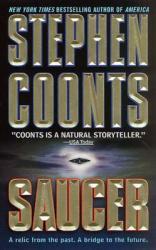
Saucer is an amazing Sci-Fi, Adventure, Thriller, and suspense book.
Stephen Coonts is a very talented Author who uses very good word choice. This is quite evident in his Saucer Trilogy, he seems to use the best wording at the best possible time. This book is definitely a great choice for all 13+ year old Audiences. Young Rip Cantrell is put under difficult circumstances numerous times. When his life and the life of Ex-Air Force Test Pilot Charlie Pine, and his grandfather are at stake, he makes a choice that will change his life from that point on. This Novel brings not only the thrill of life and death so many times, but amazing science fiction story line for us Sci Fi geeks. Obviously this book involves a saucer, Hence the name "Saucer", and this saucer appears to be lodged in that sandstone for over 140,000 years.
Now this saucer isn't made from man, as proven when Rip and his companions explore the object after days of digging it out. Over the course of this book, action escalates quickly, as Rip ends up across the world in Australia trying to save Charlie from the 2nd richest man in the world... Saucer is a stunning, action filled, adventurous book, at what might have been and what be. Go check this book out for yourself! I guarantee you will not be disappointed!
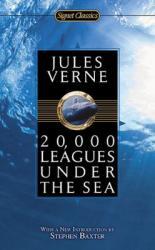
They're attacking our vessel Captain! Those savages want to kill us!", "Leave me Conciel! Save yourself my friend!". No doubt these few short phrases from the amazing novel strikes great interest in your mind. 20,000 leagues under the sea is an Adventure Fiction novel written by Jules Verne, and is by far 1 of the best books I have ever read. Professor Aronnax and his faithful servant Consiel board american frigate Abraham Lincoln to embark on a long journey back to France. On the way though, they spot a creature, a monster unlike anyone has ever seen up until that point. After a fierce battle with that monster Pierre Aronnax, Consiel, and a Canadian Harpooner are thrown overboard their frigate lost in the middle of the Vast Atlantic.
Later refuge is found aboard a metal island... Wait? Metal Island? In the middle of the atlantic? Something isn't right. Alast Captain Nemo and his crew surface the mighty vessel and capture Aronnax and his companions.
Sometime later Pierre and his companions alike, awake in a small, pitch black room, not knowing what had happened, or what is about to. Want to find out what happens next? Well go and find this book for yourself! Getting stuck underneath an iceberg in the antarctic! Battling 1 of earths mightiest creatures! Experience the great suspense, action, and adventure this novel brings to you!
Reviewer: 9th Grade
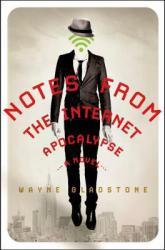
The main concept behind Notes from the Internet Apocalypse is interesting: one day, the internet just stops working. All the computers and phone lines still work, but the internet has just gone missing. The story that results should be considered a satire since I hardly believe people who have hidden behind a veil of anonymity for so long will do the same deplorable things in real life just to get their “internet fix.” Bringing the reality of our connected society to its extreme logical conclusion in a world without internet, Notes from the Internet Apocalypse is a harsh mirror of what we’ve become, even to the point of cringing at it.
I was a little taken aback by the amount of vulgar language, overt sexuality, and lack of common decency by the characters in this book. Of course, in a book about the internet, these types of people run rampant. If I were one to include animated gif memes in my reviews, I’d likely insert the Arrested Development “I Don’t Know What I Expected” one at this juncture. Yes, the internet is mostly pornography, and the rest seems to be filled with trolls who comment on news articles and YouTube videos, but I doubt these people would resort to acting out their internet lives in real life.
In the end, I had kind of hoped the subtle undertone of addiction was the focus of this book. With the main character who’s clearly alcoholic (even to the amusing point of calling Jameson’s Irish Whiskey “scotch”), and supporting characters who are either addicted to recreational drugs or sex, I wanted the satire of the book to focus on our addictive personalities as a culture, merely perpetuated and sustained via the ever-present internet. As it is, the ending wasn’t quite satisfying enough, providing a preachy bumper sticker to get readers to tune in to the next volume in this series.
An interesting concept that highlights the lowest common denominator, I give Notes from the Internet Apocalypse 2.5 stars out of 5.
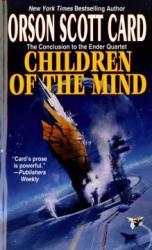
Just like Xenocide before it, Children of the Mind is difficult to separate from the previous books in the Ender’s Game series. In fact, Xenocide and Children of the Mind are considered by Orson Scott Card to merely be two parts of the same book, separated at a point in the plot that makes sense.
Even further to the point, I would consider Children of the Mind the last “part” of a story that stretches across four books. While it was easy to take Ender’s Game by itself, every additional piece of the story needs the previous parts for it to have the full impact of what Card was trying to accomplish.
What’s most interesting about this series is how each book has a different focus, almost putting them in distinct genres. Ender’s Game was militaristic sci-fi, while Speaker of the Dead was more along the lines of a mystery. And while Xenocide was the philosophical heart of the series, Children of the Mind was almost a romance in comparison. I appreciated the loose strings and sub-plots being tied up by the end of Children of the Mind, especially when it came to defining the relationships between the characters I had come to know over the last few books.
Even though the basic plot of these last three books was a simple “avoid destruction” motif, the complexity of the whole scenario did require the amount of text dedicated to it. Each element of these stories came into play in some fashion to create a satisfying ending. I’m still in awe of the technological foresight and brilliant solutions to fundamental physics limitations that Card was able to develop in these four books. I rarely have found a series that has been so consistently good across all parts of its story, and I believe the saga of Ender Wiggin is now my new favorite.
A satisfying ending to an incredible series of books, I give Children of the Mind 5.0 stars out of 5.
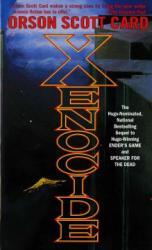
Much like authors Jules Verne and H.G. Wells were well ahead of their time in their science fiction writing, Orson Scott Card once again shows that he understood some of the key concepts of our universe. Written in 1991, Card’s Xenocide deepens and furthers the continuing adventure of Ender Wiggin that he began back in Ender’s Game . Picking up where Speaker for the Dead left off, Xenocide adds a powerful adversary while also tying plot points back to the first book in the series. In this sense, the tight intertwining of Xenocide with its predecessors makes it difficult to separate and review by itself.
I appreciate what Card has done by creating a multi-book narrative that requires the reader to have started from the very beginning of the story.
While Xenocide is not nearly the end of the series, as made clear by the astounding twist near the end, it does pull enough unresolved threads from Ender’s Game and Speaker for the Dead to create the next segment of the story. In this sense, the whole story is a multi-book epic so well-written that no detail or specific piece of continuity is overlooked. Plus, with so much history behind it, Xenocide reads at a frenetic pace, just trying to “beat the clock” of an almost assured planetary destruction.
Surprisingly, if you told me that there was a sci-fi book comprised almost entirely of dialogue and profound, philosophical arguments, I would probably assume it was boring (or at least written by Robert Heinlein). And yet, Card has brought the reasoning proposed in the previous books of this series and pulled them through to their logical conclusions, creating an engaging discussion of artificial intelligence and sentience, while wrapping the whole thing in the context of moral arguments for and against exterminating an entire species. There are no easy answers in this book, but Card has masterfully included concepts like cloud computing, interdimensional travel, and genetic engineering to get his point across.
A fantastic continuation of Ender Wiggin’s story that leaves the reader begging for more, I give Xenocide 5.0 stars out of 5.
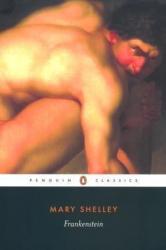
Mary Shelley's Frankenstein is a book about the horrors of creating life. The book succeeds in developing most of the sidecharacters. You learn in depth about all of their pasts, and the story fits together well. The tragic plot line of the book shows how the decisions made by Frankenstein, the creator of the monster, comes back to haunt him. It almost becomes a game of cat and mouse when Frankenstein chases around his creation for revenge when really, the monster is haunting Frankenstein for his own revenge. Most of the book's themes include loneliness and rejection, and are explained well throughout the back stories of the characters. I feel that the book's only weak point is how the characters face their end. While the characters do indeed learn many life lessons, they never really accomplish anything. None of the characters have sentimental deaths, other than Frankenstein; the book just tells the reader that the character you have just grown attached to...well, dies. The book moves on from their deaths, and then the cycle repeats for the rest of the book. Overall, Frankenstein is a really good book, and I'd recommend it to people that like horror or mystery fiction.
Grade: 8
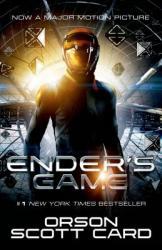
Ender's Game is an enthralling and thrilling sci-fi following a young boy as he is prepped to save the world. Ender departs for battle school at the ripe age of 6, where he is thrust into a world were children go head to head in a competition to be the best, fight in an all out war, and earn all the glory.
Although young and inexperienced, Ender is the best. But things seem to be stacked against him....
Orson Scott Card writes with incredible dexterity and Ender's Game pulls you into a new world.
(Reviewer Grade: 12)
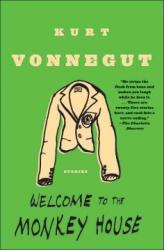
Much like short story anthologies by a single author (see Neil Gaiman’s Smoke and Mirrors and Ray Bradbury’s The Golden Apples of the Sun ), Welcome to the Monkey House is both quintessentially a collection of Kurt Vonnegut’s biting wit and satire as well as an exploration of other genres not often associated with Vonnegut’s style. Fans of Vonnegut will likely have already read some of these short stories (like “EPICAC” and “Tomorrow and Tomorrow and Tomorrow”), but some of the other stories might have been missed and for a good reason.
Overall, Welcome to the Monkey House is a fantastic set of stories, but a few of them fail to have the impact to make them memorable. Granted, these stories are few and far between, and help to break up the well-written social commentaries presented in “Harrison Bergeron” and the titular “Welcome to the Monkey House.” Vonnegut’s ability to show the slippery slope of such ideas as “everyone is equal” and “sex is bad,” respectively, is just as poignant in short form as it is in his novels. The fusion of technology in these stories might seem dated by today’s standards, but they do reveal that Vonnegut was, inherently, a science-fiction writer.
What this collection does well is show that Vonnegut understood the importance of the characters in a story. One of the most entertaining in this collection was “Who Am I This Time?” which contained characters at such extremes of human expression as to be completely unrealistic but somehow relatable and entertaining. Stories like this, which don’t necessarily follow the political or societal commentary that the other stories provide, are nice breathers that give the reader a smile instead of drilling thought-provoking ideas into their skulls. It’s this balance that truly makes Welcome to the Monkey House a must-read.
Vonnegut, true to form as well as outside his element, I give Welcome to the Monkey House 4.0 stars out of 5.
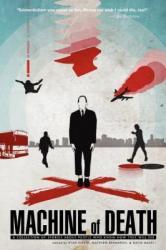
The concept is simple: a machine takes your blood and spits out a card with the means of your demise printed on it. In this collection of short stories, a variety of authors explore what this truly means for individuals, as well as society as a whole. Based off an idea by Ryan North (author of “Dinosaur Comics”), this anthology has plenty of different approaches to the concept that a machine could predict how a person will die. However, many of these ideas hit upon the same concepts and social implications, making the whole thought exercise seem redundant by the end of the book.
Part of me felt the idea itself was a little derivative of Death Note, but with a more ambiguous set of constraints. Each of the short stories included in this anthology had some unique twist on the idea, ranging from humor to romance to horror. Still, every author tended to agree: a machine of death would bring about a dystopian future in some form or other. From governments requiring a “death reading” to mitigate any national disasters to a school needing to know how their prospective students will die so they can save face, the real enemies of this idea tended to be the bureaucracies of humanity.
While I honestly enjoyed the stories included in this anthology, they all seemed to suffer from the “a priori problem.” With each story titled with some way to die, you half-expect the story’s main character to end via that method. The intrigue is more in the how and when; thus providing interest to the story despite practically knowing the ending before it even starts. Granted, that’s part of the appeal of the machine: the ambiguity is as freeing as it is constraining.
A morbid set of interesting short stories, I give Machine of Death 4.0 stars out of 5.
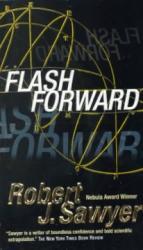
As time marches on, predictions of the future made in the past are tested against reality. In 1984, we didn't have George Orwell's dystopian government. In 2001, we didn't have Arthur C. Clarke's interplanetary travel. Sure, these authors did have a few interesting ideas that did come true, eventually. Still, they were writing well before the events in their books would come to pass. Robert J. Sawyer's Flashforward did not have that luxury. Written in 1999, Sawyer only imagines a future set a decade in the future. For those keeping track at home, Flashforward takes place in 2009, with a vision of a future 21 years ahead of that. Since 2009 has come and gone, there were a few things Sawyer got right, but many he could not have predicted.
The crux of this story is similar to that explored by Machine of Death: everyone in the world gets a glimpse of their future in 2030, thus causing everyone to react based on what they saw. Some were encouraged by what they saw, others despondent and suicidal. The people who had negative visions hoped the future could change, especially if their lives were on the line. Many of the "effects" of the look into the future were logical conclusions, which added an amount of interest to the story but with a cheap cop-out to keep from killing off all the characters. With all the different characters and POVs, it was somewhat difficult to follow along each time the
focus changed, since there was nothing to indicate a change of view.
I also appreciated the conversation this book had in regards to science and the many existing theories about the future. While this exploration of science also included the discovery of the Higgs Boson (which didn't happen until 2012), I was continually distracted by the narrator's pronunciation of "CERN," which sounded more like "sairn" instead of how I thought it was pronounced ("sirn"). I did appreciate the narrator's ability to mimic multiple accents, but that one pronunciation threw me.
A recent book about the "future" that gets a few things correct, I give Flashforward 3.5 stars out of 5.
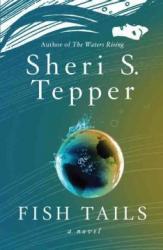
I decided to choose the book because it looked like it would tell a great story and it did. I liked the book due to its great lessons inside about the imperfections of our minds, but the greatness of them too. The part I enjoyed most was the journey f the main characters and how they didn't change their personalities and stayed focused on the topic. The part I didn't really enjoy was that the story went kinda slow. The book was pretty predictable, but the lessons and thoughts behind you need to think more about to get, so it was still entertaining to read. It was an amazing book to read and I definitely recommend it.
Reviewer Grade: 10
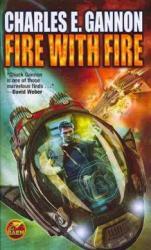
I’m not sure which is more boring in a book: a plot that doesn’t go anywhere, or a main character who is perfect. Unfortunately, Fire with Fire has both. I’ll first start with my qualms about the plot. This story started way too late, as it didn’t get interesting until halfway through.
Even when it did finally get interesting, it suddenly became bogged down in committee. Seriously? Didn’t we learn anything from the Star Wars prequels?
Adding politics to a story about traveling across space merely makes it tedious. This is also not to mention how heavy and clunky the exposition is, with almost every chapter being filled with information that isn’t important, and the jumps between chapters needing way more explanation.
Secondly, let’s take a look at “Mr. Perfect,” Caine Riordan. Aside from the egregious fact that the POV switched between 1st person and 3rd person within most of the paragraphs of his section (with no italics or indication that we were suddenly in Caine’s head), I felt this character was just the author’s way to show how smart he is. With the expansive repertoire of high-value vocabulary words and a character that always knows what to do all the time and has all the correct answers, I ended up not caring about any of it by the end. And I haven’t even mentioned the blatant and pervasive misogyny either.
Even the rest of the supporting cast was so flat and one-dimensional that I probably couldn’t tell you who they were or what their defining characteristics were (aside from that one mysterious guy who LOVED olives and feta cheese). Most of the time I was reading this book, I kept wondering, “Wait . . . what?” as what seemed to be major plot points were introduced then almost immediately forgotten until hundreds of pages later. I’m not sure how this book managed to get a series tacked on to it, or how it was even nominated for a Nebula Award, but it gives me encouragement that I could write something way better than this.
Antiquated sci-fi tropes in a recently written book, I give Fire with Fire 2.0 stars out of 5.
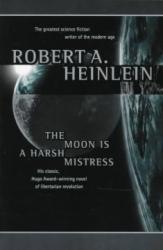
Certainly well ahead of his time, Robert A. Heinlein remains one of the definitive writers of the science fiction genre, even today. In The Moon is a Harsh Mistress, Heinlein covers such topics as artificial intelligence, extraterrestrial colonization, and interplanetary warfare. Even today, most of these subjects are accurately depicted in the narrative, even if some of the technology has advanced past where it was thought to be in 1965. Part of me is almost jealous at Heinlein’s ingenious use of Earth’s gravity well, and I know any attempt I might make to replicate the idea will merely seem derivative in comparison.
As is the case with some of his other works, Heinlein makes many socio-political statements via his writing. His stance on taxes, revolutions, and independent governing bodies is a critical section of the plot in The Moon is a Harsh Mistress, and I can certainly see the theoretical benefits he puts forth in this context. That being said, his views on polygamy and polyamorous relationships are certainly on display again, with his previous work, Stranger in a Strange Land exploring these themes in greater detail. I can only assume the "free love" culture of the 1960's shaped these opinions.
Overall, the book wasn’t quite what I expected. The initial chapters made me hope the plot would center on the relationships between man and artificial intelligence (AI). If anything, AI is shown to be a powerful tool that can influence society in ways we can’t even begin to comprehend. At the very least, the main character was quite entertaining, if not hard to understand at times with his “accent.” If we do eventually colonize the moon, I can hope we do so peacefully and in a way that doesn’t lead to an uprising of its native inhabitants. After all, I do like living in a Colorado Springs devoid of meteoric bombardment.
A well-thought out sci-fi story decades ahead of its time, I give The Moon is a Harsh Mistress 4.0 stars out of 5.
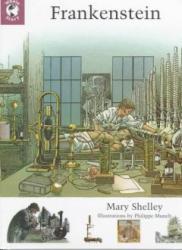
Frankenstein was a disappointment to me. As per the Romantic period, this novel used lots of scenes in nature to explain the characters’ emotional states. I do not mind a few good cries in a storm, but this novel borders on incessant outdoor melodrama. I decided to disregard both the plot and the setting in a vain attempt to enjoy the novel. I would only focus on the characters. As this was written by a female author, I looked forward to the female characters, which were awful. One, Justine, is a servant and seems only to exist in order to die. Elizabeth, who also seems to share this quality, is regarded as an object to be owned in a creepy incestuous manner by her cousin; she is apparently superior and virtuous only because of her noble birth. So, I dismissed the female characters to focus on the males, none of which were believable. Victor, his friend Henry, and his monster all were overly emotional, and they inspired no sympathy from me. With no likable characters and emotions running everywhere, I would only read Frankenstein if required.
Reviewer Grade: 9
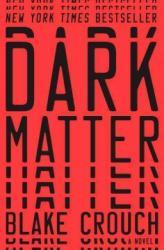
It seems to me that the multiverse is a popular topic in fiction today. Sure, there have been plenty of stories about parallel universes and the fractal branching of our decisions, but for some reason, there’s been an uptick in the number of these stories lately. Perhaps these stories are trying to find a better universe in which to live, or perhaps they’re trying to show us that the world we have could be much worse. Either way, Blake Crouch’s Dark Matter nails the multiverse plot by exploring all the different connotations of the ability to travel between parallel universes.
Presented in a traditional, three-act narrative, Dark Matter thrusts its protagonist into another version of his reality, ripping him away from his idyllic life. Using quantum physics as a form of magical hand-waving, the narrative then turns to the main character’s relentless search for his original universe. While the result of this exploration fits nicely into the book’s natural third act, I almost would have liked to see something a little different and less predictable. Still, all three acts are entertaining as a breathless thriller driven by the emotions and resolve of the main character.
The best part about Dark Matter is how it fleshes out all the consequences of being able to travel between parallel dimensions. It’s not nearly as simple as an It’s a Wonderful Life (1946) “you-never-existed” storyline. That being said, I do question why the “original” main character had the perfect life, especially if many of the other parallel universes seemed to have relatively close representations of the life he was trying to return to.
But, in the end, the narrative is driven by the characters, and these characters are well-developed and exciting to follow.
A multi-dimensional thrill ride, I give Dark Matter 4.5 stars out of 5.
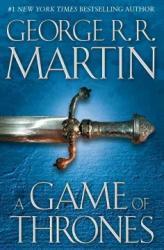
This book blew my mind. A Game of Thrones is the first book in the series A Song of Ice and Fire. These books are fantasy, and they follow the wars, events, kingdoms, and lives of the people of Westeros. This book is extremely dense, but that only means that it is full to the brink of background information and interesting tidbits about the world. The most amazing thing about this book is how developed the world is. Martin must have put an unimaginable amount of time into world-building, and this effort certainly shows. The plot is so complex, and almost all of the characters are wonderfully 3-dimensional.
Reviewer Grade: 11
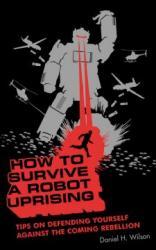
As a precursor to Robopocalypse , How to Survive a Robot Uprising: Tips on Defending Yourself Against the Coming Rebellion takes a humorous approach to educating the reader about the capabilities and limitations of today’s robots. Similar in style to Where's My Jetpack?: A Guide to the Amazing Science Fiction Future That Never Arrived , How to Survive a Robot Uprising uses the humor of preparing for the end of the world to poke fun at the limited possibility that we’d eventually be destroyed by the robots we use to make our lives comfortable today.
With my background in robotics (my Master’s Degree was in Mechanical Engineering with a focus on Robotics and Design), I quickly realized how Daniel H. Wilson was writing this “guide.” Robots are powerful and useful machines, many of which can perform actions much more efficiently and accurately than humans can, thus leading to our swift and inexorable demise.
However, by the same token, they also have limitations and challenges that we humans do not (or at least don’t consciously think about). These robotic challenges are primarily used “against” them in this hypothetical scenario, revealing that most robots aren’t as indestructible as we make them out to be in fiction.
My only qualms with this book were that it was too short (I love this tongue-in-cheek writing style) and that the structure seemed kind of “loose.” Sure, different sections went over such topics as types of robots, and what ways these robots could be incapacitated, but the flow felt a bit like “stream of consciousness” writing. Granted, many of the topics cross over into each other, so it can be difficult to box them into discrete and distinct sections. Still, the narrative seems to jump all over the place as a result. Perhaps this is why Wilson decided to eventually write Robopocalypse, to add the structure that was missing from this “pamphlet.”
A funny book that subtly educates the reader about robot strengths and weaknesses, I give How to Survive a Robot Uprising 4.0 stars out of 5.